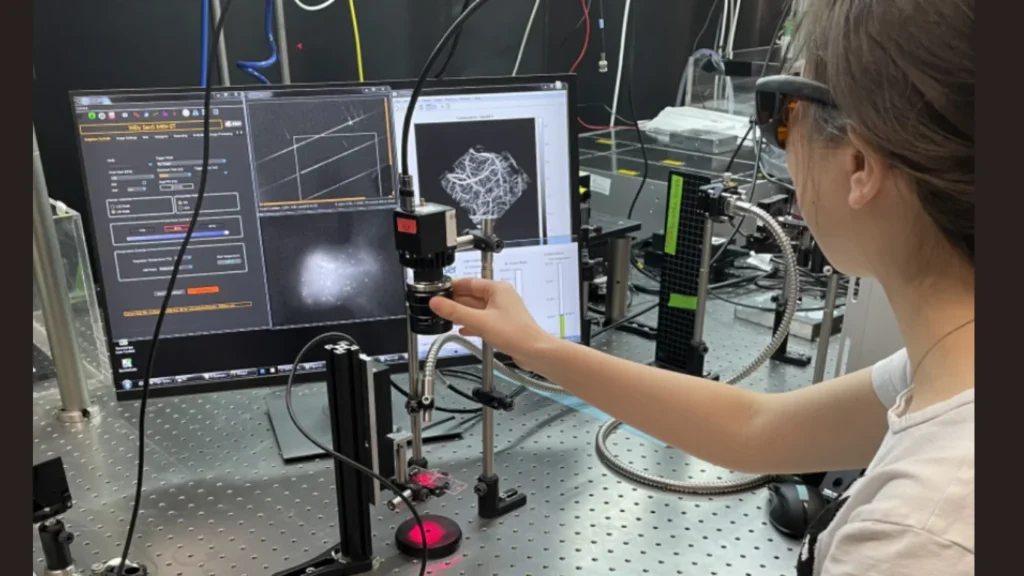Foldy Lab Zurich: With state-of-the-art research illuminating its complex systems, neuroscience is leading the charge to understand the complexity of brain function. Professor Csaba Földy’s Foldy Lab in Zurich is a pioneer in this area. The group, which is housed at the esteemed University of Zurich’s Brain Research Institute, is making important progress in our knowledge of how neural networks function. Important facets of brain activity, including synaptic transmission, the impact of GABAergic inhibition, and the function of Neurexin proteins, are the focus of the team’s investigation. These innovative investigations are advancing our knowledge of the adult brain’s complex functions.
Exploring the Impact of Foldy Lab Zurich in Neuroscience Research
Foldy Lab Zurich is a cutting-edge research facility that is making major contributions to the field of neuroscience. It is situated inside the esteemed Brain Research Institute of the University of Zurich (UZH). Under the direction of Dr. Csaba Földy, the lab works to identify the basic processes that regulate brain activity, with a focus on comprehending how cellular and molecular systems regulate brain function. In order to pave the way for future therapeutic developments, Foldy Lab Zurich is doing cutting-edge research that aims to shed light on both the normal operation of the brain and the root causes of neurodevelopmental disorders.
Investigating the Brain’s Neural Circuitry
The core idea of Foldy Lab A thorough examination of the neural network of the brain is the focus of Zurich’s study. The goal of the lab is to comprehend how signalling pathways and chemical interactions allow brain cells to communicate with one another. The team is learning how disturbances in brain transmission may be a contributing factor to diseases like schizophrenia and autism spectrum disorder (ASD) by examining these processes at the cellular level. In addition to advancing scientific understanding of brain development, this research is paving the way for the development of novel therapies for a range of neurological disorders.
A key focus of their work is synaptic communication—the intricate process through which neurons transmit information. Foldy Lab Zurich is dedicated to identifying the molecular factors that regulate the strength and balance of these neural connections. Their research aims to highlight how errors in neuronal communication can contribute to cognitive and behavioral challenges, with the potential to guide future therapeutic strategies.
Key Areas of Research at Foldy Lab Zurich
1. Understanding Synaptic Plasticity and Neural Communication
Learning and memory processes depend heavily on synaptic plasticity, which is the capacity of synapses to change their strength in response to neuronal activity. Exploring how neurones communicate through synaptic connections is a major area of research at Foldy Lab Zurich.
Both excitatory and inhibitory synapses are the subject of the lab’s research, which aims to determine how synaptic strength imbalances may be a factor in a range of neurological conditions. The lab offers important insights into how alterations in synaptic plasticity can affect behaviour and cognitive capacities by determining the chemical components involved.
2. Investigating Neurodevelopmental Disorders
The molecular causes of neurodevelopmental diseases, with a focus on autism spectrum disorder (ASD), are also covered by Foldy Lab Zurich. The lab has contributed to the discovery of important genetic alterations that impact brain development and synaptic processes. Their research on inhibitory interneurons and how they function in synaptic communication has improved our knowledge of conditions like autism and epilepsy. The lab helps create more specialised and efficient treatment approaches by identifying the genetic and molecular abnormalities linked to these disorders.
3. Exploring Molecular Mechanisms in Neural Networks
The lab looks at how different chemical elements inside neural circuits affect brain function in addition to synaptic plasticity. The team investigates the functions of certain proteins and receptors that control neuronal communication and plasticity using cutting-edge imaging methods, electrophysiological, and molecular biology. Gaining a better knowledge of how neural circuits work and how they might be influenced by changes in the brain or external inputs requires this research.

Advanced Research Methods at Foldy Lab Zurich
Several innovative methods are used by Foldy Lab Zurich to improve its research:
Optogenetics: This cutting-edge technology uses light to precisely control neurone activity. It provides a strong instrument for real-time synaptic function observation, offering in-depth understanding of neural circuit dynamics.
The study of electrophysiology This method measures how synaptic connections react to stimuli by measuring the electrical activity of neurones.It is essential to comprehending how synaptic plasticity affects memory and learning as well as how information is processed inside neural networks.
The field of molecular biology This method helps identify the root causes of synaptic dysfunction and its effects on general brain health by concentrating on the molecular components of neurones, such as proteins and receptors essential for synaptic communication.By examining these molecular processes, the lab improves our comprehension of the intricate nature of brain illnesses.
Advancing Neuroscience: The Study of Neural Circuits at Foldy Lab Zurich
The main goal of Foldy Lab Zurich is to investigate the complex structure and operation of neural circuits, which are vital for facilitating neuronal transmission and maintaining vital brain processes. The brain functions according to these circuits, which control everything from memory creation to cognitive processing. The group is discovering the mechanisms that underlie both normal brain activity and abnormalities that result in neurological illnesses like autism, epilepsy, and schizophrenia by investigating the molecular functioning of synapses and the structure of neural circuits.
The group is expanding our knowledge of how Neurexin proteins are essential for synaptic communication under the direction of Professor Csaba Földy, a distinguished specialist in molecular neuroscience. The healthy operation of synapses, the junctions where neurones exchange information, depends on these proteins. The results of the lab have given fresh perspectives for comprehending and treating neuropsychiatric disorders by shedding light on how abnormalities in synaptic signalling might cause cognitive and behavioural difficulties.
Synaptic Communication and Brain Connectivity
A key component of Foldy Lab Zurich studies synaptic transmission, which is the mechanism by which neurones exchange information. The team is primarily interested in the regulation of this communication, particularly in relation to GABAergic inhibition and the equilibrium between excitatory and inhibitory signals. This precise balance, which affects everything from motor coordination to emotional regulation, is necessary to preserve normal brain function.
Synaptic transmission, which explains the process of signal transmission across synapses, is one important field of study. The group seeks to map brain networks responsible for different cognitive tasks by exploring the chemical mechanisms governing synaptic activation. Understanding how synaptic signalling failure can result in neurological illnesses is essential for the development of tailored therapeutics that correct these imbalances.
The Importance of Neurexin Proteins in Neural Circuitry
A key element of Foldy Lab Neurexin proteins, which are essential for preserving synaptic connection and guaranteeing efficient neuronal communication, are the subject of Zurich’s research. One protein that has been found to be crucial in controlling synaptic activity is neurexin-3. Particularly in brain circuits involving GABAergic inhibition, these proteins aid in balancing excitatory and inhibitory impulses.
The significance of Neurexin-3 in brain function is evident from its role in preserving synaptic integrity. When the expression of Neurexin-3 is disrupted, it can lead to impaired communication between neurons, which may result in cognitive deficits and behavioral issues. Foldy Lab’s research has shown that such disruptions are often associated with neurodevelopmental disorders like autism spectrum disorder (ASD) and epilepsy. By investigating the molecular pathways that Neurexin proteins influence, the lab is uncovering new approaches for understanding and potentially treating these conditions.

Collaborative Research at the Brain Research Institute
Foldy Lab Zurich plays a key role in advancing neuroscience through its collaborations with other research groups at the Brain Research Institute. This interdisciplinary approach merges various fields such as molecular biology, neurophysiology, and computational neuroscience to offer a more comprehensive understanding of how the brain functions. By partnering with experts across different scientific domains, Foldy Lab is able to approach complex questions regarding brain activity from diverse angles, leading to innovative insights.
These partnerships also extend beyond the University of Zurich, connecting the lab with leading neuroscience institutions around the world. This global network of collaboration enhances the lab’s ability to access a broad range of expertise, furthering the progress of neuroscience and enriching the study of brain health.
Advancing Mental Health Understanding Through Neuroscience
The findings of research at Foldy Lab Zurich have broad ramifications for the treatment of mental illness. The group is laying the groundwork for more individualised treatment approaches by discovering cellular and molecular abnormalities that lead to disorders like autism and schizophrenia. The function of inhibitory interneurons, which are crucial for preserving brain circuit balance, is one of the lab’s core study topics.When this equilibrium is upset, a variety of behavioural and cognitive problems may result.
The present trend in mental health care, which stresses customised therapies rather than one-size-fits-all approaches, is consistent with this emphasis on precision medicine. Findings at Foldy Lab may change the way mental health issues are approached and managed by enabling the creation of therapies that are especially suited to each patient’s genetic and biochemical makeup.
Animal Models in Neuroscience: Insights from the PV-Cre::Ai9 Mice
In its quest to understand neural circuits, Foldy Lab Zurich utilizes innovative animal models, such as the PV-Cre::Ai9 mice. These specially engineered mice are equipped with fluorescent markers that enable researchers to closely examine neural circuit activities. By investigating these models, the lab focuses on how specific neuron types, particularly inhibitory interneurons, influence brain function.
These genetically modified mice are especially valuable for studying neurological disorders. Through these models, researchers explore how disruptions in inhibitory circuits may contribute to conditions like epilepsy, where the failure of inhibitory controls can lead to seizures. The insights gleaned from these studies offer important revelations about the development of neural circuits and the consequences of their dysfunction.
Impact on Autism, Epilepsy, and Schizophrenia Research
The research conducted at Foldy Lab Zurich plays a crucial role in understanding neurodevelopmental and psychiatric disorders such as autism, epilepsy, and schizophrenia—conditions often caused by malfunctions in neural circuits. By identifying the molecular mechanisms behind these disruptions, the lab is creating new avenues for better understanding and treating these complex conditions.
For example, the lab’s work on Neurexin-3 has uncovered that mutations in this protein can lead to improper synaptic communication, potentially contributing to autism spectrum disorders (ASD). Additionally, the lab’s exploration of GABAergic inhibition provides valuable insights into epilepsy, focusing on how imbalances in excitatory and inhibitory signals can provoke seizures.

Looking to the Future: Advancing Neural Circuit Research
As the lab moves forward, Foldy Lab Zurich continues to make significant strides in neuroscience research. The future research agenda will delve deeper into the intricate interactions between genetics, environment, and brain development. The goal is to further understand the formation and disruption of neural circuits in neurological disorders.
With advancements in technology, Foldy Lab is incorporating artificial intelligence (AI) and machine learning to analyze the vast amounts of data generated from its experiments. These technologies are poised to revolutionize neuroscience, enabling researchers to identify subtle patterns in neural activity and uncover previously elusive aspects of brain function.
Through its ongoing work, Foldy Lab Zurich remains at the forefront of understanding the molecular and cellular mechanisms that regulate synaptic transmission and neural circuit function. Their research continues to hold immense promise for developing novel treatments for neurological disorders, offering hope to those affected by conditions such as autism, epilepsy, and schizophrenia.
Final Words
At the forefront of neuroscience, Foldy Lab Zurich investigates the complex processes underlying brain circuits and synaptic communication. By means of its innovative studies on molecular pathways, animal models, and cutting-edge technology, the lab is gaining important knowledge about neurological illnesses and brain function. The lab’s work, which focusses on precision medicine, has the potential to influence how mental health services are provided in the future by providing fresh perspectives on and approaches to treating diseases including schizophrenia, epilepsy, and autism. Foldy Lab Zurich is committed to expanding scientific understanding and enhancing lives with ground-breaking neuroscience discoveries as they develop and work together globally.
For the latest in neuroscience breakthroughs and cutting-edge research, stay connected with Gravity Internet.




